#(the section wasn’t about racism it was about some other thing that’s entirely irrelevant. but I’ve since realized it’s false-
Explore tagged Tumblr posts
Note
wait gamzee was written in anti black way?? it kinda does make sense now that i think about it but i never got that perspective from just the comic alone
Hello, Anon. Hussie was a known Anti-Black Racist for years before Homestuck dropped - to the point of including Anti-Black Racial Caricatures in her comics and also flippant usage of the N-Word - and Gamzee is introduced to us as an impossible to understand, dirty, drug-addled, ugly, stupid teen with an absent father and a religious devotion to rap/hip hop. Later, it is revealed that hard drugs were the only thing keeping him from being excessively violent and abusive.
I’m pretty sure that is Anti-Black, especially coming from someone who was… You know… Anti-Black, and has portrayed explicitly Black characters in similarly cruel and stereotypical fashions.
#i need to redo one of my older posts on this because it has a section I now do not agree with but otherwise is very solid#(the section wasn’t about racism it was about some other thing that’s entirely irrelevant. but I’ve since realized it’s false-#-so I’m retracting that part of the statement.)#homestuck#homestuck meta#gamzee makara#cw racism#nekro.sms
75 notes
·
View notes
Text
On ADHD, Being Dramatic, and Being Lazy
Gather round everyone. It’s time for our every-few-monthsly post on ADHD by your local ADHD ghost. In this episode, we’re talking about ADHD and how it relates to “being dramatic” and “being lazy.”
On Being Dramatic
No doubt a lot of you have been told you’re being dramatic over the years. I know I have. There are a lot of reasons one might be dramatic, but they’re rarely about the drama.
If I’m to guess the origin of the word dramatic, I’d guess it probably has something to do with over exaggerating your response for the drama. I’m sure you’ve seen plenty of people being dramatic - on tiktok and vine, on youtube... drama calls for dramaticism.
Do you want to know what isn’t dramatic? Genuine reactions. That’s right - genuine reactions, inherently, cannot be categorized as dramatic or hyperbolic. There is nothing about them that is being overdone with the intention of getting attention or entertaining other people. So, let’s talk a bit about how this conflation has hurt us as a community.
Growing up, everything I did was “dramatic.” Crying because I didn’t want to do more chores was dramatic. Having a panic attack because there was a spider in the room was dramatic. Freaking out because I needed people to stop touching me was dramatic. Getting angry when my mother made jokes about my sex life as a teen was dramatic (and apparently abusive, but that’s neither here nor there). Nothing I did that involved a noteworthy amount of emotion was anything, if not dramatic.
On Being Lazy
I know a lot of you have also been labeled as lazy over the years. “Lazy” is the diagnosis everyone loves to give to those who don’t do enough, in their eyes. If you “could have” done something and then “chose not to,” you’re lazy... right?
Growing up, I was lazy too. I was lazy for avoiding housework. I was lazy for not wanting to brush my teeth. I was lazy because I didn’t turn in my homework. I was lazy for staying in bed, on my computer, most of the day.
If I’d only just “applied myself,” or if I would just “put in the work,” then I would be respectable to the people around me. But, because I wasn’t “willing” to put in the time and effort, I was lazy.
Why Is Emotion Dramatic?
The short answer is: it’s not. The real question is, why do people seem to perceive emotion as being dramatic? These are real emotions, after all - real and genuine feelings that are being dismissed as playacting. There are a number of reasons.
Why Are We Lazy?
Again, the short answer is: most people aren’t. The question here is, why do people see others not doing something and assume it’s because they simply don’t want to put in the work? Why do they not seek out an explanation or consider other alternatives? There are a number of reasons for that too.
The Answer...
Editing to put a Read More here because it’s very long
(TW for each of these sections in their name)
1. Sexism
At its core, seeing emotional outbursts or responses as dramatic is inherently rooted in sexism. Whether you’re a boy or a girl, man or woman, if your emotions are being mocked, it’s almost definitely because of our world’s history of sexism and relating emotion to women, who are “illogical” and “just want attention.”
And “real men” work! They work hard! They work long hours! They put themselves into an early grave, with pride, by never sitting down to rest! For this very reason, women, housewives of decades past, were expected, after a long day of doing housework and caring for the children - things that are just as exhausting as a full time job - to dote on their husbands who had just returned from work expecting a hot meal and a beer to be ready for them. Her work is devalued. It wasn’t grueling or tiring or important. It was just “women’s work.” A wife who does all of the housework and child rearing and fails to provide a hot meal and a warm body to her husband is “lazy.”
This is further shown to affect men as well. We can see, as early as non-manual labor-based jobs existed, the men who took them were lesser. Men who work at computers are seen as nerds and geeks - weak. Men who work in universities, coming up with new solutions to our medical needs and discovering the mathematics we need for space travel and advanced technology - they’re weak too. They’re unimportant to society because they’re not willing to get their hands dirty. Those men who prefer artistry are called gay and seen as disposable. It is irrelevant to the conservative man that his artistic counterpart designs everything that fills his home and office - that without artists we would have nothing.
2. Racism and classism
You might be surprised, but racism and classism both have their hands in this as well. I’m talking full on systemic oppression. The ability for people in power to look down on those they see as beneath them for being emotional or passionate about a topic or incident is all about power. You can see a million examples of this today. POC are called dramatic or are implied to be blowing things out of proportion by conservative white people because they want equal rights and feel they’re being treated unfairly. Their emotions are dismissed as irrational and dramatic.
The cries of the poor, whether white or of color, are mocked. They have no reason to be having the emotions they’re having because they wouldn’t be in the position they’re in if they weren’t “lazy.” After all, only lazy people don’t have money. Only lazy people can’t get work. If they had just “applied themselves,” they would have an income, a home, and ample food on the table.
3. Ableism
And, last but not least, we have ableism. The neurotypical and abled people of the world, at large, cannot understand the experiences of the disabled, both emotionally(those with mental illnesses, disorders, and so on(whether or not certain disorders can be categorized as a disability in a just society is another topic entirely, but they are regarded that way, generally)) and physically.
If you have sensory overload, you are being irrational. It doesn’t matter to a NT if this is caused by an actually chemically different response in your brain. It doesn’t matter if it’s Real To You. To them, it doesn’t make sense, and so you deserve no compassion for your experience. Your emotional response is dramatic.
If you have executive dysfunction, you are simply choosing not to do your work. It doesn’t matter that there is an actual reason, buried in you somewhere, for why you have become Stuck. It doesn’t matter if you feel crippled by this aspect of your life. They see that you have neglected to do something they deem easy. Therefore, you are “lazy.”
ADHD and Being Dramatic
For those of us with ADHD, being called dramatic is a very familiar experience. After a while, we begin to internalize it. We must be dramatic, right? After all, so many different people have told us we are - and for good reason. We do tend to get overly emotional.
So the question is, why? Why do we get overly emotional? Why are our emotions so much different than those of our NT peers?
1. Lack of Emotional Regulation
A big part of ADHD, which is not yet a diagnostic criteria, is our emotional disregulation. ADHD, inherently, comes with some amount of disregulation in our emotions. We have a hard time controlling the emotions that we feel and managing the intensity of them. They may come across as overly intense, or they may seem subdued, both for reasons we can’t possibly figure out as individuals. This disregulation is entirely out of our control, happening at a neurological level. Our brain chemicals don’t work as they should. But, no matter how unregulated our emotions are, they are still real. We do still feel them, exactly as intensely as we think we do. Disregulated does not mean made up.
2. RSD
If you knew about RSD before, or you’ve read my last post on ADHD (under my tag adhdghost), which has gained some popularity, you already know what this means. For those who don’t, RSD is short for Rejection Sensitive Dysphoria. This condition plagues something like 99.9% of people with ADHD (while not being ADHD exclusive.) It comes with the lack of emotional regulation and means we have a reaction, that seems out of proportion (or “dramatic”), relative to the thing that caused it.
In short, RSD episodes can look like an entire breakdown, a very sudden loss of any self esteem or confidence, the feeling that you are certain someone now hates you or has secretly always hated you, and/or an immediate need to get rid of the thing that caused it. These episodes are caused by any kind of perceived failure or disappointment. They can be caused by someone whose opinion or relationship we value who gives us a slightly judgmental look, someone saying they don’t understand why we like the thing we’re interested in, or even not living up to our own expectations. These episodes frequently lead to emotional outburts, episodes, breakdowns, and tears. Naturally, all of this is “dramatic,” despite it being very real and painful for those experiencing it.
3. Combination with Other Things
Emotional disregulation can interact with other parts of our lives as well. For instance, I have a lot of phobias. My reactions to seeing or being around the things that terrify me can be even more intense than how most people react to their phobias. They can cause anxiety attacks, emotional breakdowns, and lasting fear for hours or days after. My recovery from these instances is hindered by my inability to regulate the feelings they caused.
Emotional disregulation can also interact with triggers, trauma, sensory problems, etc.
ADHD and Being Lazy
And of course, if you struggle with ADHD, you want to know, “Why am I so lazy?” The answer is: you’re not! Laziness is a made up word. Laziness was created to pass blame onto people who struggle to do things that more typical people can accomplish with ease.
So, what is the reason we struggle to do these seemingly simple tasks?
1. Executive Dysfunction
This is The Big One. Of all the things that can cause an inability to do things, executive dysfunction is the Achilles heel of ADHD. Because ADHD causes a difficulty with prioritizing, rewarding actions with no immediate reward, and creating a list of steps for us to take (something that comes naturally to NT people), we sometimes get “Stuck.”
This feeling of being stuck may look like us just having fun and avoiding our responsibilities. You may be Stuck right now, scrolling through tumblr mechanically even though you’ve been needing to pee for three hours. Naturally, you’ve been wanting to go to the bathroom... you just don’t know how.
To a NT, this sounds ridiculous. “Just get up and go?!” I’m sure you can imagine your parents saying, when they simply don’t understand. The truth is, tumblr can be a nightmare for executive function. It endlessly scrolls, giving you post after post. There’s no natural stopping point. You keep an eye out for a natural end to this activity, but it’s hard to find the right post to stop on. If you find those, “This is your sign to go to bed,” posts helpful - otherwise locked into the activity of scrolling regardless of whether you want to - you might be struggling with executive dysfunction.
This inability to “queue” our actions or prioritize what we need to do, and in what order, can wreak all kinds of havoc in our lives. You remember you didn’t really understand that equation the math teacher explained earlier. You know today’s homework is related to its use. Therefore, you cannot start your homework. There are a number of possible solutions floating around your head. Maybe the book will explain it better. Maybe your parents know how to do this and you could ask them. Maybe you could Google it. It’s possible the homework is about something else. But, if it is, what if you don’t understand that? Maybe you should ask your teacher before class?
Even though you have all of these solutions in your head, because you don’t know which solution is the best solution, you find yourself unable to do any of them. You show up to class with no homework and your teacher gives you a disappointed look. “I don’t understand why you don’t just apply yourself more. You’re a very smart student.” The remark brings you to holding back tears, because you want, with every fiber of your being, to apply yourself and make your teacher proud, but you simply don’t know how.
This is the destructive nature of executive dysfunction, and it is not something to be taken lightly.
2. Distraction
For those with ADHD, the inability to regulate external stimuli makes focusing incredibly hard. You wake up one morning and plan to start that English paper after breakfast. You go to get yourself some cereal. You’re out of milk. You decide to make toast instead. You burn your toast because you lost track of time for just 30 seconds. You go to throw it away, feeling an overwhelming amount of guilt over the two pieces of bread you wasted. The trash is overflowing. You decide to take it outside. It’s a really nice day out. Maybe you should take your dog for a walk. You haven’t taken her on a walk in a while and you’re just now feeling motivated to, so you should take advantage of that. You go to retrieve your dog and take her for a walk. When you bring her back in, you go to get her treats from the shelf in the laundry room. Oh yeah, you’d been meaning to do laundry. You go to get your laundry hamper from your room and notice there’s a bunch of laundry on the floor. You begin picking up the laundry from the floor. You may as well tidy up the other things on the floor as well. You finally get around to taking your laundry to the washer. You’re out of soap. Maybe you ought to make a run to the grocery store. You take ten minutes to find your keys and wallet and then head out to the grocery store. When you get there, you’ve forgotten what it was you needed. “Oh, right! I’m out of milk!” You go and retrieve milk. When you get to the checkout and the cashier rings you up, you suddenly remember you need laundry soap. Well, it’s too late now. You’ll have to do laundry tomorrow. You can’t risk the cashier giving you a tired look by asking them to wait. You go home and make some cereal. You can’t really write while you eat, so you open tumblr. you scroll through tumblr for a while. Your cereal gets soggy, you notice, disappointed. You see a tumblr post reminding you that you forgot to order something important online that you need to get here as soon as possible. The day continues in this way until you finally realize at 5pm that you never started your paper. “It’s so late now... I’ll just start it tomorrow morning,” you tell yourself. Rinse and repeat.
If you relate to this, you might want to consider researching ADHD a bit, because this is a very typical ADHD experience.
3. Hyperfixation and Hyperfocus
The last prominent reason why people with ADHD are seen as lazy has to do with a cycle in hyperfixation and hyperfocus.
If you don’t already know, hyperfixations are those interests you have that fill you with an overwhelming love and which take up an incredible amount of your time, energy, and brain space. These could be fandoms, hobbies, characters, games, or otherwise.
Hyperfocus, on the other hand, can be related to hyperfixations or things that aren’t hyperfixations. Hyperfocus is when you get “locked in” on a task and can’t seem to put it down. If you started this post not knowing how long it was and find yourself still raptly reading, completely ignoring the world around you, you may have hyperfocused on it. If you ever start cleaning and just can’t stop until the whole house is clean, despite your lack of regularly cleaning for over a month, you are hyperfocusing on cleaning. If you write a 20k word fic in one night, you are hyperfocusing.
Hyperfocusing can leave you completely unaware of the world around you, causing you to neglect your own basic needs, such as food, bathroom breaks, water, and social interaction.
Because people with ADHD are able to occasionally apply themselves to such an extreme degree, NT people don’t understand why ADHD people are unable to apply themselves to other things as well. The reason we can’t is because we do not regulate our hyperfocus. Hyperfocus comes from tasks that are giving us serotonin, to make up for our brains inability to give serotonin in the way it should - in the way NT brains do. Emptying the dishwasher just felt really good. The next thing you know, you’re filling it with more dishes and wiping off counters and sweeping the floor and, “oh god, it looks so nice what if I just-” and then you move on to the laundry and the living room and the bedroom and then somehow 6 hours have passed. You don’t know how it happened, but now your house is clean and you feel amazing... but also tired and hungry. So you go make some food and then pass out on the couch.
So, when NT people see this kind of laser focus, they demand to know why you couldn’t do that simple math assignment, or why you haven’t been returning their texts, or why you couldn’t apply the same level of energy and enthusiasm on that really boring geography project. They demand to know why you’re so “lazy” the rest of the time.
There’s also the element of hyperfixation. It is the ultimate distraction. Your parents tell you to do the dishes and you say you will. Suddenly, you’ve found a fanfiction about your hyperfixation and you can’t stop reading it. It’s 60k words long and it will take you all day, but you’ll find a break to do your chores somewhere in there, right?
Your mom is suddenly knocking on your door what feels like 5 minutes later, but it’s been an hour. She wants to know why you didn’t do the dishes yet. You’re upset at yourself, but you lash out at her, because you’re unable to regulate your emotions. “I’ll do it in a minute!” you say loudly from behind your door. She walks off, irritated. You ask yourself why you can’t just do it now. Why does it feel impossible to tear yourself away? Your hyperfixation is the ultimate creator of hyperfocus. It rules you.
Before you know it, it’s midnight. You’ve finished the fic. It was amazing. You realize with dread that you still haven’t done the dishes, so you sneak out to the kitchen, hoping your parents have gone to bed. They have, but you find the dishes have already been done by someone else. Suddenly, you’re holding back tears from the RSD episode this has triggered. You ruined everything. You disappointed your parents. You’re a lazy and terrible child and they deserve better.
The truth is, you’re none of those things. In fact, you’re struggling with one of the most difficult mental blocks someone can have. But to others, you’re just making excuses. To others, you should have been able to just do the dishes and then go back to reading. But you know it’s not that easy. But why?
It’s ADHD, Babey!
If this post is hitting hard in a way that feels like your life is being splayed out before you, you might just have ADHD.
The fact is you are not dramatic and you are not lazy. You are struggling with a lot of ADHD symptoms that are making functioning in a neurotypical world incredibly difficult. This world was designed by and for NT people. Your worth is not based in how you live up to their expectations.
If you think you might have ADHD, it might be time to ask your doctor about getting an ADHD evaluation. Please check out my last post (the one i mentioned is under my tag adhdghost) to get more information on RSD and on getting evaluated.
An Important Note
Many experiences and struggles caused by ADHD are also present in other disorders. For example, RSD can be seen frequently in autism as well as in anxiety, depression, and PTSD. Sensory overload, emotional disregulation, executive dysfunction, and so on, can all be present in things other than ADHD. If you want to know if you fit the criteria for ADHD, go check out the criteria on the ADDitude website, which is a great source for ADHD related information.
#adhdghost#adhd#ghostpost#actuallyadhd#add#attention deficit disorder#attention deficit hyperactivity disorder#autism#actuallyautism#(im not autistic but know this may be helpful for those with autism alone or comorbid autism and adhd)#executive dysfunction#hyperfocus#hyperfixation#rsd#trauma mention#abuse mention#racism mention#classism mention#sexism mention#ableism mention#spoonie#spoonie strong#disability#long#longpost#long post
90 notes
·
View notes
Photo

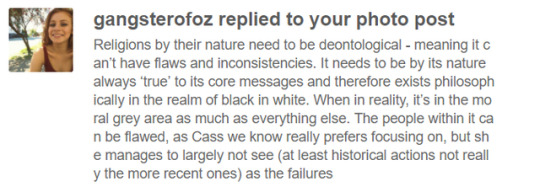
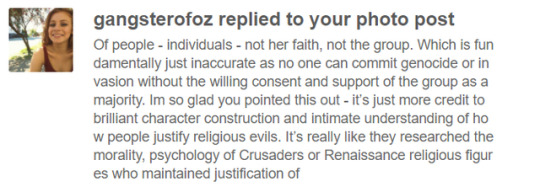
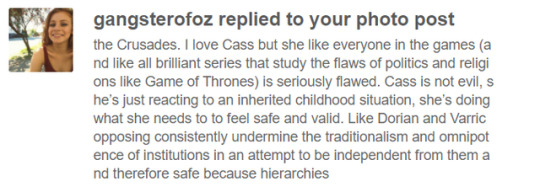
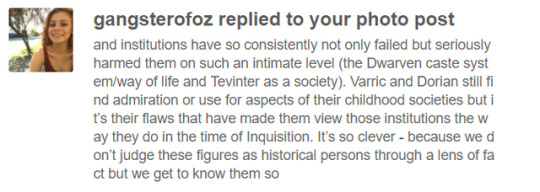
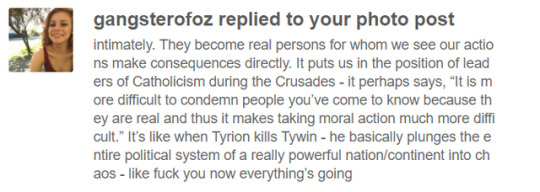
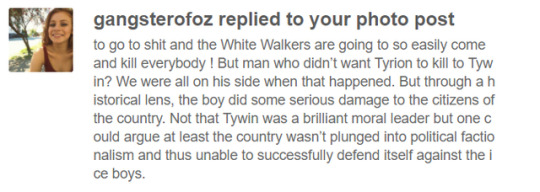

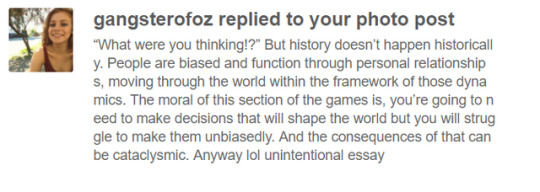
(Replying to this post)

@gangsterofoz I’m... not really sure... where to begin... I suppose by just saying I’m kind of stunned you wrote all this in response to me point out Cassandra was wrong about something and the writers’ reasons are ridiculously transparent?
Well it makes sense that Cass would try really hard to convince herself of the Chantry’s justified actions - it’s not that she’s purposely trying to condemn the elves, she just does not want to see the evils and mistakes of an institution she has pretty much built her adult life on. A life that allowed her to follow a path she felt was befitting of her skills and soul. And like many people with religion, they cannot seperate the institutional failures and serious misconducts from the faith.
I absolutely agree it is in character for Cassandra to be ignorant about this, given other things she has said expressing refusal to acknowledge elven point of views. But it’s not a good quality for her to have. And as @faerunner already said, the big problem isn’t that Cassandra has this point of view, it’s that this is the only point of view we hear. Dorian shares it too. But here is no argument. We’re just supposed to accept this comment, despite as I pointed out in that post, it is inaccurate.
Religions by their nature need to be deontological - meaning it can’t have flaws and inconsistencies. It needs to be by its nature always ‘true’ to its core messages and therefore exists philosophically in the realm of black in white. When in reality, it’s in the moral grey area as much as everything else. The people within it can be flawed, as Cass we know really prefers focusing on, but she manages to largely not see (at least historical actions not really the more recent ones) as the failures of people - individuals - not her faith, not the group. Which is fundamentally just inaccurate as no one can commit genocide or invasion without the willing consent and support of the group as a majority. Im so glad you pointed this out - it’s just more credit to brilliant character construction and intimate understanding of how people justify religious evils.
Hey maybe don’t paint every single belief system with the same Christian/Catholic brush because that’s not true?
I would argue that Cassandra is almost equally bad at recognizing the failures of people in recent times as well.
It’s really like they researched the morality, psychology of Crusaders or Renaissance religious figures who maintained justification of the Crusades. I love Cass but she like everyone in the games (and like all brilliant series that study the flaws of politics and religions like Game of Thrones) is seriously flawed. Cass is not evil, she’s just reacting to an inherited childhood situation, she’s doing what she needs to to feel safe and valid.
LOL I think you are giving BioWare way to much credit, but yes, a comparison between Exalted Marches and the Crusades can definitely be made. It’s just a shame that, as the whole point of that post, they didn’t spend just as much time on how the victims felt.
Like Dorian and Varric opposing consistently undermine the traditionalism and omnipotence of institutions in an attempt to be independent from them and therefore safe because hierarchies and institutions have so consistently not only failed but seriously harmed them on such an intimate level (the Dwarven caste system/way of life and Tevinter as a society). Varric and Dorian still find admiration or use for aspects of their childhood societies but it’s their flaws that have made them view those institutions the way they do in the time of Inquisition.
You are comparing Dorian opposing tyranny to Cassandra defending it?
It’s so clever - because we don’t judge these figures as historical persons through a lens of fact but we get to know them so intimately. They become real persons for whom we see our actions make consequences directly. It puts us in the position of leaders of Catholicism during the Crusades - it perhaps says, “It is more difficult to condemn people you’ve come to know because they are real and thus it makes taking moral action much more difficult.”
HOLY FUCK.
No. No, I absolutely judge through facts, and you know, general morality. No, it absolutely does not make it more difficult to condemn a character saying something wrong when they are in fact, 100% wrong.
It’s like when Tyrion kills Tywin - he basically plunges the entire political system of a really powerful nation/continent into chaos - like fuck you now everything’s going to go to shit and the White Walkers are going to so easily come and kill everybody ! But man who didn’t want Tyrion to kill to Tywin? We were all on his side when that happened. But through a historical lens, the boy did some serious damage to the citizens of the country. Not that Tywin was a brilliant moral leader but one could argue at least the country wasn’t plunged into political factionalism and thus unable to successfully defend itself against the ice boys.
I have no idea what you’re talking about because I stopped watching Game of Thrones after dragging myself through the second season; I found the story interesting enough, but the copious amount of gratuitous sex and also general shitty treatment of the few characters of colour and female characters was too much to continue. But I’m gonna go on a limb and guess this has nothing to do with anything in the post I made.
So yes Cass is super wrong but it also is 100% how she would manipulate herself to see that slice of history. I mean - how scary is that that a leader has that view sitting on the Sunburst Throne (if you pop her there)? You say, “well she’s got all these great qualities etc.” but then what are the ramifications of putting someone with some form of internalised racism in a position of power?
Oh gee, what a high-fantasy thought-provoking question that is. A person who gives zero shits about the people who’s land they settled on and now rule over. I wonder what the ramifications would be. It is so hard to wonder. I just don’t know. //Sarcasm
What if she in some years starts another Exalted March? Historically, we’d look at the Inquisitor and go, “What were you thinking!?”
Yeah I sure fucking would especially because my Inquisitor would never do that to her people.
But history doesn’t happen historically. People are biased and function through personal relationships, moving through the world within the framework of those dynamics. The moral of this section of the games is, you’re going to need to make decisions that will shape the world but you will struggle to make them unbiasedly. And the consequences of that can be cataclysmic. Anyway lol unintentional essay
This might be news to you, but sometimes making decisions using bias can be a good thing. It’s called having a moral conscious. So yes, as I have said a few times now, I will absolutely judge Cassandra for lacking one in this scene. And general history knowledge.
Anyway, this whole unintentional essay was almost entirely irrelevant to the point of my post, but whatever. Glad we could clear up that what Cassandra said here is a bad thing and bad things should be recognized as bad things, not unquestioned qualities.
67 notes
·
View notes
Text
Where two or three are gathered? --Matthew 18:1-20 -- June 20, 2021
If memory serves, the first time I heard the phrase “where two or three are gathered” misquoted was on a blustery winter evening in the fellowship hall of my first congregation. A few minutes after Bible study was to begin, the unusually small group concluded that no one else was coming on this cold evening. It was at that point when one of the members said, “I sure am glad Jesus said, ‘where two or three are gathered, I am with them.’ Looks like we just make the cut tonight!”
We all recognized the good-natured joke, and no real harm was done by the misapplication of Matthew 18:20; after all, Jesus’ presence among us is not dependent on the number who have gathered. But do we realize that Jesus’ promise to be with “two or three gathered in my name” is intended for times when difficulty threatens the fabric of our fellowship, and not when we are few in number?
Tell it to the church
The reason there is a Church of the Brethren is largely because of the presence of the word church in Matthew 18:17:
If the member refuses to listen to them, tell it to the church; and if the offender refuses to listen even to the church, let such a one be to you as a Gentile and a tax collector (Matthew 18:17).
I’ve been around Brethren long enough to have learned a few things about us: first, because so many of our congregations have such deep family connections, we tend to be conflict-avoidant. It is a somewhat surprising lesson to realize how often a church that claims to value peacemaking doesn’t live into the reality that peacemaking isn’t about the avoidance of conflict, it is about the transformation of conflict. And if I may say, it’s “Cousin Billy’s” fault. David Shumate first taught me about “Cousin Billy” with the advice that “everyone knows Cousin Billy is a jerk, but they’ll still be dealing with him at Thanksgiving dinner long after you’ve moved on. So be careful taking him on, even though you know he’s in the wrong.” Sometimes we Brethren have learned that lesson a bit too well.
The second lesson is that when we hear these words from Matthew 18, we really get hung up on this whole idea of treating someone as a Gentile and tax collector and we equate that with “shunning” or “churching” someone. Churches—like the Brethren—who have this kind of practice in their past also have a long list of stories when people were “churched” for trivial reasons. But in our rush to throw out Jesus’ instructions (which is largely what we have done) we have also thrown out the ability to deal with the really harmful situations in life. If you’ve been following the news of the Southern Baptist Convention this week, then you know that one of the things they’ve been wrestling with is how to handle allegations of sexual abuse and misconduct that have apparently been covered up by denominational leadership. The painful reality is that there are times when the church must confront an offender and say that not only will certain behavior not be tolerated, it must be named and exposed.
But for all our discomfort with these verses, we Brethren cannot avoid the role these verses played in our formation as a visible church community. There are some rough parallels between our times and the early 1700’s when Alexander Mack and some others were experiencing a spiritual awakening. One of those rough parallels is the notion that you can be a Christian on your own; that you don’t really need things like public worship and communion and baptism and confession of sin to be a follower of Jesus. But it is in this passage that Jesus uses the word church; it’s from the Greek ekklesia, a word that never refers to the place Christians meet but instead refers to a group of people who have gathered.
This is where the teaching about “where two or three are gathered” becomes important, because it is in this most vulnerable and painful moment of congregational life where Jesus’ promise is uttered; even “two or three” is enough to accomplish the purposes of the Gospel.
It always comes down to humility
But it may be that our ability to be the church that Jesus seeks in Matthew 18:20 depends on our willingness to wrestle with our own preference for greatness.
Things It so often comes down to our desire for greatness. Greatness captured our imagination long before the word was adopted as part of a political campaign slogan. Human beings have typically valued people who can rise to the top of whatever it is they are doing. In team sports we ultimately measure an athlete’s success by how many championships they’ve won, not by how many individual records they’ve set. We tend to measure the success of a church by how many people are in the pews, not by any number of other Biblical measuring sticks. We tell our children they can be “anything they set their mind to” and encourage them with “participation trophies.”
The pursuit of greatness has its place—many technological advancements have certainly been achieved that way. But when confronted with the disciples’ question, “Who is the greatest in the kingdom of heaven?” Jesus answers in a very “un-great” way: by offering them a child as their illustration. It is difficult for us to fully grasp Jesus’ point here, because we live in a culture that schedules it’s life around children and their activities. For instance, I don’t believe I have ever encountered a congregation who has made it’s primary church growth strategy reaching out to senior adults. Congregations commonly say they want to grow by attracting “young families with children.” But I don’t believe I have encountered the congregation who says, “You know, there’s all these grandparents out there; or there’s all these single people out there; let’s make them our primary mission strategy.”
Jesus’ culture did not revolve around children. Children were not the most important people in everyone’s lives, they were the least important people in everyone’s lives. It is hard to comprehend what it was like to live in a culture where children were largely unimportant. But it is entirely consistent with Jesus that he would choose the least important, most overlooked, consistently neglected people around him and lift that person, or that group up as an illustration for faithfulness. Spiritual greatness will not be measured by clawing ourselves to the top of the heap and making connections among the rich and famous; it will instead be measured by our willingness to diminish ourselves, our willingness to become irrelevant in the eyes of the culture and build relationships with the people we find there.
Cast out your eye; pursue the lost
It is within this context that Jesus’ harsh words about stumbling blocks come into play. We are not to do anything that would cause a vulnerable person to stumble. If our goal is to be like Jesus then the so-called “little” and “least” persons of our culture will be our teachers. And if our pursuit of greatness—even greatness in the kingdom of heaven—comes at another’s expense, then it is not greatness we are pursuing; it is a stumbling block. Heaven help the one who puts a stumbling block in front of someone whose connections to the means of life and faith is precarious. The pursuit of greatness on any terms other than Jesus’ must be rejected.
The reason Jesus the ramps up the teaching about stumbling blocks in the section about cutting off hands and feet and eyes is to help us see that the erection of stumbling blocks in someone else’s path will actually cause us to stumble. Too often, we are guilty of measuring sin only by considering it’s impact on our own life. But have we done the even harder work of measuring sin’s impact on someone else’s life?
Why did the lost sheep wander off? It’s easy to blame the sheep for being inattentive, stubborn, or stupid. But this is the trap of greatness: sin is always “their” issue. So when someone has wandered off, we can be tempted to wonder “What did they do wrong?” And it’s not too big a step from there to look down from our preferred position of greatness and say, “I would never do such a thing.”
But what if the lost sheep went astray because the flock wasn’t doing its job? What if the lost sheep went astray because the shepherd had become inattentive? Not to pick on the Southern Baptists this morning, but how many so-called “lost sheep” are out there because they were sexually abused or taken advantage of by a pastor or other member of the church? How many so-called “lost sheep” are actually people who have grown weary of the church’s unwillingness to honesty confront racism? How many people wandered away from a place that was supposed to be spiritually safe but wasn’t because others had erected stumbling blocks? This is the place where the power of “two or three gathered in Jesus’ name” comes in. Jesus challenges us to confront the sin that pushes people away from the safety of the flock, because sin is never entirely individual. Sin always has an impact on other people. When our own sinful behavior is a means by which others are despised, it is the work of the church to confront those who erecting stumbling blocks that they, too, might return to the safety of the flock. It only takes two or three to seek to bind sin and let loose forgiveness to begin this powerful gospel work.
The hymn Forgive our sins as we forgive that we used for our Call to Worship is a helpful reminder of why we cannot follow Jesus on our own, but must have the benefit of the church community to assist us in our transformation. The hymn reminds us
Lord, cleans the depths within our souls, and bid resentment cease. Then, bound to all in bonds of love, our lives will spread your peace.
It only takes two or three for God’s purposes to be accomplished in our lives!
0 notes